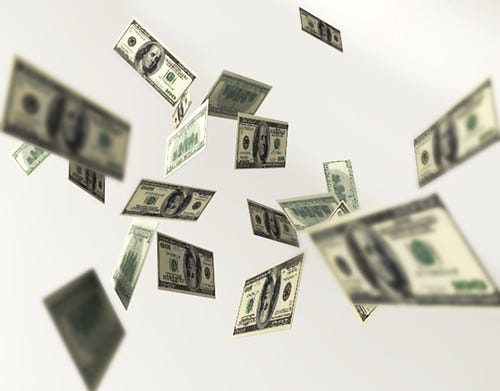Ten big businesses just pocketed $95 million — and you paid for it
New data show that a Florida law that raised taxes on consumers to pay for tax cuts for businesses has so far overwhelmingly benefited a few big firms.

This is Seeking Rents, a newsletter and podcast devoted to producing original journalism — and lifting up the journalism of others — that examines the many ways that businesses influence public policy across Florida, written by Jason Garcia. Seeking Rents is free to all. But please consider a voluntary paid subscription, if you can afford one, to help support our work.
Just after 11 p.m. one night in April of last year, Florida Gov. Ron DeSantis signed a bill that raised taxes on Florida consumers by more than $1 billion a year — and cut taxes on businesses by roughly the same amount.
Known as Senate Bill 50, this was an enormous tax shift. It forced consumers to pay more sales tax when they shop on Amazon and other websites. And it allowed businesses to pay less tax in two places: A tax that funds unemployment benefits for workers who get laid off, and a tax charged when businesses lease property.
Corporate lobbyists were downright giddy about this bill. “Ultimately, this is a win, win, win for the business community,” the Florida Chamber of Commerce wrote in a message to its members. “Or what we like to call the triple crown.”
And now we know why the Florida Chamber — a front group funded in large part by a small handful of the state’s biggest companies — was so happy.
New data from the Florida Department of Revenue show that the business tax cuts in Senate Bill 50 — which, again, were paid for by increasing taxes on consumers — have overwhelmingly favored a small number of firms.
For instance, the top 10 employers1 saved a combined $95 million in the first year. That’s roughly 10 percent of the total tax savings for all businesses.
The top 100 taxpayers saved nearly $206 million in the first year — or roughly one-fifth of the total.
We don’t know the names of these lucky giants, because business tax returns are secret under Florida law. But the list likely includes big firms with lots of employees who did widespread layoffs or furloughs during the height of the COVID-19 pandemic. This is because companies that force more workers into unemployment have to pay higher unemployment taxes to help finance benefits for those workers.
So it’s a good bet that one of Ron DeSantis’ favorite rhetorical targets on the campaign trail — the Walt Disney Co. — is one of the biggest beneficiaries of this tax cut, at least so far.2
Signing Senate Bill 50 was one of the most consequential actions of DeSantis’ first four years as Florida’s chief executive. Because of this legislation, the Republican governor and 2024 presidential hopeful ended up raising taxes on Florida consumers during his first four years — even though DeSantis cut taxes overall (because he cut taxes so deeply for businesses).
It’s also not the only DeSantis tax cut has favored the biggest firms over everyone else. The second biggest business tax cut of DeSantis’ first term was House Bill 7127, which DeSantis signed in 2019 and which cut Florida’s tax on corporate profits by approximately $2.8 billion.
That package included nearly $625 million in corporate tax refunds that the DeSantis administration sent out earlier this year — more than $100 million of which went to just 10 giant corporations.
The top 10 employers here are defined as the companies that would have had the 10 highest unemployment tax bills in 2021 had Senate Bill 50 not been passed. Those 10 companies would have owed approximately $107 million had DeSantis vetoed the bill, according to Department of Revenue data. Instead, they paid about $12 million — a savings of $95 million.
The way that Senate Bill 50 works is that it first cut the state’s unemployment tax. That tax cut will remain in place until the account that Florida uses to pay unemployment benefits to workers has been sufficiently replenished. Once that happens, Senate Bill 50 will then permanently cut the tax businesses pay when they lease property, from 5.5 percent to 2 percent. At that point, the mix of companies getting the biggest savings will change, though there could be some overlap. By the way, Publix Super Markets — one of the main funders of the Florida Chamber of Commerce — spends more than $600 million a year on lease payments.




